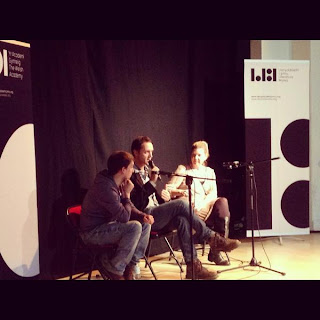A valuable day of informative and creative sessions and
the chance to meet fellow writers, industry professionals and publishers from
Wales.
Promote your work by intelligent use of social media.
Author
and arts critic Jasper Rees, social media consultant Emma Meese and poet Osian
Rhys Jones gave advice about using:-
Twitter
- Build or join a community
of interest around your writing. 50 followers you keep communicating with
is worth more than touting for 1000s with no guarantee they will
contribute or seriously comment on your work.
- Devise profiles for your
characters to maintain interest in your story
- Use nostalgia as a tool
for arousing interest.
Facebook
- Use lists to target your
audience.
- Beware sharing tweets with
FB which treats them as spam.
- Use a quote of the day
& photo to support it.
Promoting your work abroad – Wales Arts International have
grants for attending workshops & conferences abroad.
Nia Davies from Welsh Literature
Exchange will handle translations of your work.
Genre Writing – don’t be slavish to what conventions are expected. Write what pleases you and you will be able to argue about genre when you have the ear of a publisher, says science fiction author Jasper Fforde and crime novelist
Belinda Bauer.
Getting an agent. Enter your work in competitions. Publishers
and agents will contact you if you are shortlisted.
Angela's 7 Key Points of Pitching
- What EXACTLY are you pitching?
What exactly do you want? To convince an industry professional first
convince yourelf by answering the question “Why does this book need to be
written?”
- Who is your catcher? What does
the catcher want?
- The right ball for this game?
- Designing a pitch –matching
what you and your catcher offer and want
- Structuring for maximum impact.
Start the pitch with a para stating why the book must be written and a log
line of the story. 2nd para should be an outline of the plot to
give reader a desire to turn the pages
- The catcher sees and sees
why
- Pitch to be catchable
Mention must be made too of Jon Gower's contributions, anecdotes of his encounters abroad and poetic readings from his book Too Cold for Snow. Also from Christine James who read in Welsh with those of us non-speakers being provided with headphones and a live translation service (thank you Christian). Such was welcome lubrication for the drier mechanics of information exchange, useful as it all was.

